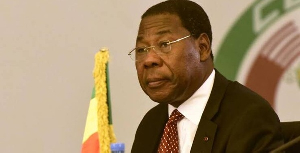Major Courage Quashigah, Minister of Food and Agriculture on Tuesday said the role of African women in achieving sustainable development had been limited by barriers such as discrimination and lack of access to education, health services, land and credit.
He said sustainable development could not be achieved without the full participation of African women, who produced 60 per cent of food crops, and were the main players in processing, preservation, storage, marketing of food crops as well as food preparation for the family.
Africa would not be able to meet its goals of sustainable development without empowering women, considering the significant role they played.
Major Quashigah said this in a speech read for him at the openning of a four-day seminar on women, integrated farming systems and food security in West Africa.
About 20 participants from Ghana, Benin and Cote d'Ivoire are attending the seminar, organised by International Centre for Enterprise and Sustainable Development (ICED) in Accra.
Maj. Quashigah said cottage industries in the rural areas would promote rural women's role in sustainable development, adding that African women's access to education and training, formal and informal, must be increased since education remained one of the most effective ways of promoting sustainable development.
Ghana's agricultural development agenda presently required that those directly in agricultural production be considered during policy formulations and planning, he said.
He said this trend showed increasing concern for small-scale farmers as a whole, but such policies tended to concentrate only on male farmers.
It was only recently that few policies were beginning to address some particular problems facing women, who were directly responsible for most of the food production and preparation, he added.
Maj. Quashigah stressed the need for prioritisation and focusing on extension services and rural development and putting the people concerned in the position to secure adequate quantities of quality foodstuff by their own efforts.
He said the industry implemented a strategy to develop the capacities of all MOFA staff to carry out gender analysis for better planning of agricultural programmes.
It has also established the Women in Agricultural Development Directorate to develop policies and programmes that would resolve constraints of women farmers.
Rev Fr. Godfrey Nzamujo, Director of Songhai Agricultural Development Centre in Benin, said there was the need for African farmers, policy makers and stakeholders to redesign the farming systems and to provide women with easy access to financial services and market.
The seminar will also discuss other issues on land tenure and land management, organic agriculture, Irrigation, a tool for ensuring food security in west Africa, industrial farming system and food security.
General News of Tuesday, 25 November 2003
Source: GNA












